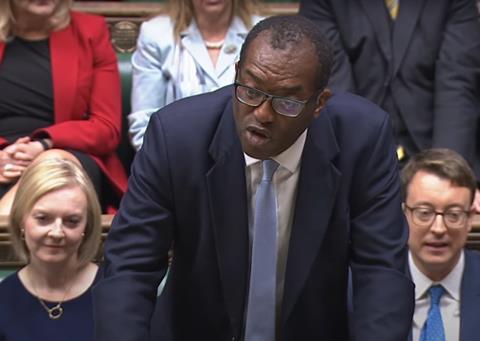Chancellor’s ‘mini-budget’ included sweeping cuts to taxes and regulations aimed at reversing construction slump
New chancellor Kwasi Kwarteng has pledged to “get out of the way to get Britain building” as he announced sweeping cuts to taxes and regulations designed to put a shot in the arm of the flagging construction industry.
The stamp duty threshold will be doubled from £125,000 to £250,000 and raised for first time buyers from £300,000 to £425,000 in a permanent cut effective from today as part of a package of measures announced this morning.
The ‘mini-budget’ was Kwarteng’s first major economic intervention since his appointment earlier this month and comes following yesterday’s warning by the Bank of England that the UK may have entered a recession.
The chancellor also provided more details on heavily trailed ‘investment zones’ which will be set up around the country to boost local economies.

Stamp duty will be abolished altogether on purchases of land and buildings for commercial or new residential development in the zones, which will also offer tax relief for structures and buildings and 100% tax relief on investments in plant and machinery.
Kwarteng confirmed the government is in “early discussions” with nearly 40 places on establishing the zones, including the Tees Valley, the West Midlands, Norfolk and the West of England.
He also unveiled plans to speed up the planning system for major infrastructure projects by bringing forward a bill within the coming months which will “unpick the complex patchwork of planning restrictions and European Union-derived laws which constrain our growth”.
“We will streamline a whole host of assessments, of appraisals, of consultations, endless duplications and regulations,” he said, adding: “The time it takes to get consent for nationally significant projects is getting slower not quicker while our international competitors forge ahead. We have to end this.”
He said the government will also increase the disposal of surplus government land to build new homes, although further details were not provided.
Other major interventions included slashing the basic rate of income tax by 1p to 19p from April 2023, abolishing the 45p tax rate for top earners over £150,000, scrapping a planned rise on corporation tax from 19% to 25% and reversing a 1.25% rise in National Insurance from 6 November.
A major package of support to help households and businesses with energy bills announced earlier this month will cost around £60bn over the six months from October, Kwarteng said, significantly less than the £150bn which had been widely expected.
He also announced a target to achieve annual economic growth of 2.5% by reforming the supply side of the economy, boosting investment and increasing incentives to innovate.
Yesterday the Bank of England forecast that the UK economy shrank by 0.1% in the third quarter of the year following a 0.1% contraction in the second quarter, which would mean that the UK has entered a recession.
The central bank also raised interest rates to 2.5% - the highest level in 14 years - in an effort to tame rampant inflation which is forecast to peak at 11% next month.
Total construction orders fell by 10.45% in the second quarter on the previous three months, the largest quarterly fall since the final quarter of 2020.
Architects react to Kwarteng’s “mini-budget”
RIBA President Simon Allford:
“With a looming recession and worsening energy and climate crises – today was a pivotal opportunity for the new government to provide reassurance.
“Whilst additional financial support for household energy bills will provide short-term relief, and new funding for energy efficiency improvements signals some progress, measures fall short of the National Retrofit Strategy we have been calling for. It’s a missed opportunity.
“Nevertheless, the Chancellor’s cancellation of the planned corporation tax rise will likely be welcomed by many of our members, and the Energy Bill Relief Scheme will also alleviate some of the costs of doing business in the short-term.
”We will continue to work with government representatives and our counterparts across the sector to lobby for a UK-wide housing retrofit programme and champion the critical role of architects in delivering safe, well-designed spaces that support long-term wellbeing.”
HKS regional commercial business leader Angus Duguid:
“The relaxing of planning regulations creates a risk of poorly thought through development and inadequate S106 settlements, ultimately meaning that local people lose out. Reducing the requirement for change of use could be beneficial but should absolutely reflect the key priorities of an area – whether that’s boosting employment or providing affordable homes.
“A better route would be linking investment in these areas to ESG style funding support, to promote more sustainable development. My concern is these approaches risk addressing a short term horizon rather than setting a structure to support local communities in the long term.”
SPPARC principal Trevor Morriss:
“The introduction of investment zones with more flexible rules to support planning and development is a positive indication that the government wants to get Britain building, however, we desperately need consistency in policy and approach to ensure delivery.”
“Over the last 12 years we’ve had 13 housing ministers. This is the fourth in 2022. New legislation like the Levelling Up Bill has fallen off the statute books faster than the time it takes to receive permission for new development. The revolving door of new decision-makers and doubt that casts on promises of change is damaging to our economic growth and long-term prosperity — so we must see the government act swiftly to deliver in the months ahead to fulfil the much needed outcome.”
















No comments yet